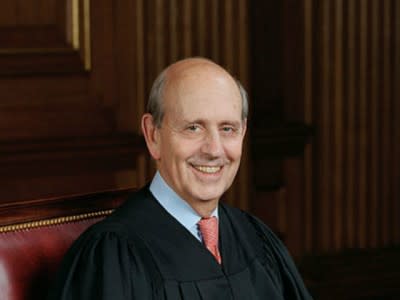Breyer uses the “L-R” word to describe credit card case
Few historic Supreme Court decisions generate an animated discussion among legal scholars than a 1905 Court decision about bakeries. That’s why Justice Stephen Breyer’s use of the “L-R” word in Tuesday’s court arguments was seen as a noteworthy sign for the case.

The petitioners in Expressions Hair Design v. Schneiderman are New York state merchants who want to be able to tell customers that their credit card transaction prices are higher than their cash prices by using the word “surcharge” to describe the price difference. They claim it is a free speech issue.
New York’s attorney general is defending a law that punishes merchants for using the “S” word (surcharge), claiming the state has a right to pass rules about economic conduct. The state says that applying a strict free speech definition to credit-card transaction laws is wrong because the laws just regulate commercial conduct and they have an incidental effect on free speech.
On Tuesday during arguments, Justice Breyer framed the argument in a different way, alluding to that 1905 bakery decision.
“It is a form of price regulation, and price regulation goes on all over the place in regulatory agencies. And so the word that I fear begins with an L and ends with an R; it’s called Lochner. And there we go,” Breyer told Deepak Gupta, the petitioner’s attorney.
Gupta tried to defend his First Amendment argument, but Breyer cited questions from his fellow Justices earlier in the session to make his point.
“Justice Alito is right. The law as written actually can be read — and Justice Sotomayor said this before — as just requiring a single price. Now, that’s something that none of the parties here say, but if you just look at the law, that’s what the law says,” Breyer countered.
The Court’s 1905 opinion in Lochner v. New York has been a lightning rod for discussion for over a century. It was also about a law in New York state, the Bakeshop Act, which limited the number of daily and weekly hours worked by bakeshop workers. The Supreme Court, in a 5-4 decision, held that the offending section of the Bakeshop Act was unconstitutional and it interfered with the right of contract between employers and employees under the 14th Amendment.
The Court’s next 30 years is now commonly referred to as the “Lochner era,” when struck down laws regulating labor conditions under Lochner’s conception of the 14th Amendment. The Lochner era ended in 1937, the Court began to allow some government regulation of the labor market, after the case of West Coast Hotel v. Parrish. The Lochner legacy, had inferred by Justice Breyer, is that a Lochner-like decision would weaken the ability of states to regulate prices and drive such decisions more to the courts.
Breyer then returned to the price regulation issue when Stephen Wu, the New York state attorney, was making his case to the Court. “Help me. I may be the only one that needs this help, but I do have this Lochner problem,” Breyer said as he made a long statement about price regulation.
“The fact that you have the questions you’ve had and both sides of the bench have had such trouble with this, to me, is strong evidence that the Court should stay out of this under normal First Amendment standards. Because if we don’t, we are going to discover all kinds of price regulation all over the place that suffers to greater or lesser degrees from this kind of problem, and you’ll have judges all over the country substituting for regulators and others in trying to regulate. That’s where I’m coming from,” Breyer concluded.
Court observers seemed to believe after arguments that the First Amendment part of the case seemed to be facing problems. “A U.S. Supreme Court case that was touted as a significant retail business dispute with First Amendment ramifications seemed to fizzle fast Tuesday as justices questioned whether freedom of speech was involved at all,” said Law.com’s Tony Mauro.
Recent Stories on Constitution Daily
Trump addresses Emoluments Clause, but will it be enough?
Kushner’s appointment brings attention to anti-nepotism law
Supreme Court hears case today on disabled children and public schools

